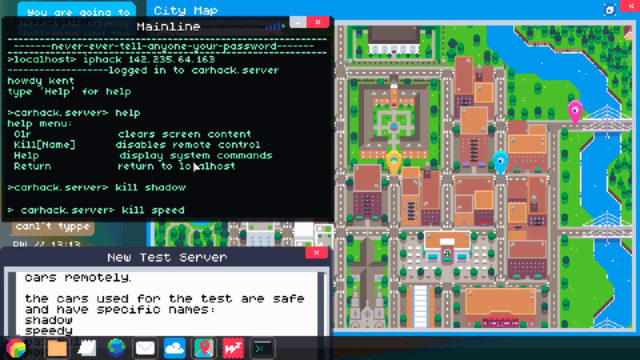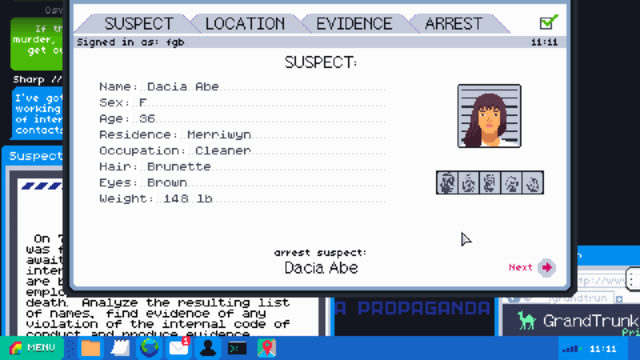Unique take on point-and-click adventuring; 16-bit take on popular operating systems and programs; unique story and gameplay concepts
Cumbersome controls; story falls short of potential; undoubtedly better on PC
Adventure games have presented a number of interesting settings and scenarios. The earliest examples featured nothing but text before evolving into a golden age defined by the pirates and grim reapers LucasArts popularized. More recently, the genre has moved in a more cinematic direction thanks to the many efforts of the now defunct Telltale Games. Mainlining is yet another new direction for adventure games, even if it takes the “point-and-click” concept in a much more literal direction.
Upon starting the game, you’d be forgiven for thinking someone had installed a 16-bit version of Windows XP on your Switch, but that look is very much intentional. In Mainlining, you assume the role of a cybersecurity professional working to gather the digital evidence necessary to put away a group of rebellious hackers and drug dealers. Naturally, this means doing your own fair share of hacking as you look for the necessary files buried within suspects’ systems needed to put them away for a lengthy prison sentence. The concept is definitely intriguing, but unfortunately a concept is ultimately only as good as its execution.
As the game is presented via the view of your character’s desktop, the concept for the controls is actually very straightforward for anybody who has used a PC since the implementation of GUI. You can open various programs and even move their various windows around much as you would on a real computer; the only major aesthetic difference is the pixelated, SNES style visuals. Unfortunately, this approach to interface presents a rather predictable problem: the interface on consoles. Were I playing on computer, I imagine it would be nearly flawless, but on the Switch, the less immediate nature of analog sticks compared to a mouse presents an issue. Playing in portable mode does allow the use of the touch screen and while this ultimately proves the best way to play the game, it is still far from perfect. Typing on the virtual keyboard is most certainly better, but it’s still much slower than an actual keyboard would be, plus certain icons are too small and certain actions, like scrolling, are still better pulled off via the analog sticks.

Mainlining is presented in chapters as you are emailed case files with a particular objective that involves identifying a suspect and finding the necessary evidence to convict them of their crimes. This usually starts with browsing through some related in-game websites before identifying the best systems to hack in order to find the files most likely to result in a guilty verdict. While the game presents more programs to use for this purpose as the game moves on, the core loop remains largely the same as you will almost always wind up hacking a system and plundering its HDD for relevant files. It’s not a bad mechanic in and of itself, but the cumbersome controls make it somewhat annoying as you might find yourself repeatedly hacking the same sites via the awkward virtual keyboard as you slowly piece together exactly what you are looking for. Constantly having to slowly type in the same command prompts gets a little frustrating at times.
Writing and story are most certainly important in this sort of game, and that thankfully transitions more smoothly onto Switch than the controls, though it’s still not perfect. Mainlining has an appreciable sense of humor to it thanks to a plethora of references to, and parodies of, popular websites and computer programs accessed throughout the game. Also, even though they are presented only through emails and chat logs, your fellow investigators have a surprising amount or personality that captures the mix of humor and cynicism that colors pretty much every real-world workplace. Unfortunately, the central conflict against a foe that is more or less your legal and ideological opposite could use a lot more punch. The game hints at how the government for which you work has crossed into morally questionable grounds with the amount of power it has granted to your cyber-crime unit, but the fact that your opponents aren’t just digital anarchists but also drug dealers pulls the story back from what could have been an interesting gray area.

This direction of storytelling intersects with gameplay in a surprisingly mundane problem area that plagues many adventure games- the seemingly arbitrary nature of puzzle-solving. Convicting a suspect involves three steps: identifying the criminal, locating them, and then submitting the evidence. The first two are fairly straightforward, but the evidence aspect is at least a little flawed thanks to the fact that you can only present one piece of evidence. This is where the classic trope of random adventure game puzzles comes into play as the choice of which evidence presents the best outcome feels awfully random. In the game’s defense, often more than one document will often result in a conviction, though some will result in longer sentences than others, but said length doesn’t really seem to have an effect on the game. Still, it doesn’t always make sense as in one case presenting an email in which the suspect admitted to the crime resulted in an acquittal, and thus a fail state, while the rather random transaction history of their bank account was enough to put them behind bars. The fact that the failure to present the right criteria only sets you back a matter of seconds makes this a little less frustrating, but it still harkens back to the worst aspects of the genre’s history.
Mainlining deserves credit for presenting an original and interesting take on a familiar genre. Let’s be honest, presenting a point-and-click adventure in the form of a point-and-click operating system is kind of genius, even if the idea doesn’t fully translate to a console like the Switch. Of course, there is a certain benefit to the fact that this isn’t a game driven by twitch reflexes; the cumbersome nature of the touch and controller inputs serve only to slow the gameplay, rather than outright ruin it. Still, the frustration presented by these control issues alongside the failure to realize the potential of the concept and story are still very real and are likely to impact the overall enjoyment of any gamer longing to live their fantasies of being a white hat hacker. By no means is the overall experience beyond redemption, but one can’t help but feel the PC is the better fit.
Nintendojo was provided a copy of this game for review by a third party, though that does not affect our recommendation. For every review, Nintendojo uses a standard criteria.




 ShareThis
ShareThis





